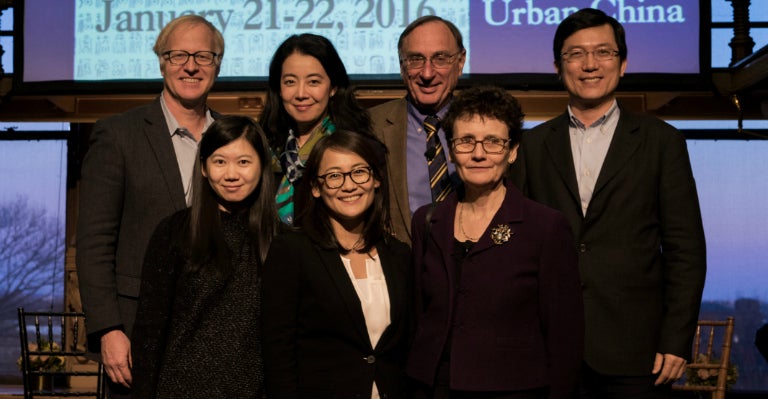The Good Life: Defining Happiness in China
 Assistant Professor of Sociology Becky Hsu (front row, center) and several of her colleagues at the January “Blessed Happiness” symposium on Georgetown’s Campus. Photo by Alex Hu.
Assistant Professor of Sociology Becky Hsu (front row, center) and several of her colleagues at the January “Blessed Happiness” symposium on Georgetown’s Campus. Photo by Alex Hu.
March 8, 2016—In one of her recent courses, Georgetown College’s assistant professor of sociology Becky Hsu asked her students to conduct interviews with their friends around one idea: to describe a time that they felt really happy.
“I thought it would be a fun way for them to try interviewing,” Hsu explained.
But Hsu’s interest around the concept of happiness has deep roots; for the past three years, she was part of a research team that investigated how people in China today define happiness. With support from a grant of nearly $1 million from the John Templeton Foundation, Hsu and five colleagues conducted fieldwork to study how Chinese people define happiness and “the good life” in urban areas. They then created a new happiness survey that was conducted with 2500 participants across China in January 2016.
“We all did a different slice of life in China, and we think that the findings from urban life have a lot to say about rural life as well because people are really traveling back and forth a lot,” Hsu said.
Surveys like Hsu’s are conducted around the world in an attempt to both understand, and, in some cases, improve well-being. Researchers from a variety of fields want to know not only how happy or unhappy people are, but also what factors contribute to these feelings. In recent years, there’s been a larger, global demand for this type of research. Hsu says that organizations such as the United Nations, the World Bank, and the Organization for Economic Cooperation and Development have all launched significant efforts to understand happiness.
“Governments are really interested in this and actually use happiness measures for their policy,” Hsu said.
“In psychological and economic work, there’s been a focus on good mood and some aspects of well-being. And that’s really the English version of ‘happy,’” she continued. “They do talk about meaning, but they categorize it as an aspect of the good life. But I—taking queues from the Chinese language and observations of the social life—think that they’re separate.”
In her work, Hsu also noticed significant differences in how her subjects felt about family. When interviewing Chinese students, Hsu often heard that their levels of happiness were derived from their relationship with their parents, whether good or bad.
“That was a pattern I saw, and it was very striking,” Hsu said. “There’s this identity that people have where they’re thinking, ‘I’m not just an individual, I am who I am in my family.’”
The importance of family lineage is also reflected in Hsu’s subjects’ feelings about death. During one interview, Hsu’s subject excitedly showed off the set of burial clothes and jewelry she’d chosen, as well as the portrait she plans to have displayed at her funeral. Another subject made her burial clothes by hand, but told Hsu she was thinking about making another set in the event that her figure changes before she passes away.
“It’s really important to them,” Hsu said. “They’re putting a lot of time into these preparations. I think that the way people [in China] approach death has to be viewed in the context of the rhythms of everyday life, and that includes interaction with the deceased members of the family. They’re constantly doing things to remember the deceased, and there’s something about habit that makes death kind of normal. I suspect that feeling ‘surprised’ by death might possibly be unique to the United States.”
Hsu wants to explore these differences further in a book about the idea of a good death—she hopes to conduct more field work in the U.S. for the project.
“In China, it was nice to come across people who are able to make a meaningful and good event out of something that here is scary and not spoken of—it seems to be a helpful way to go through these important moments in life,” she said.
In the meantime, Hsu and her fellow researchers will also be writing a book about their findings. In January, they presented preliminary results at Georgetown during “Blessed Happiness (Fu): Visions of a Good Life in Urban China,” a symposium that featured a range of discussants who have an interest in the concept of happiness. A group of survey researchers also met to discuss the implications of ethnographic work on cross-national surveys—which often involve a large number of countries.
“In our survey we had some new approaches and we’re going to see how well they work,” Hsu said. “My hope is that some of those things can be incorporated in future surveys that will really allow us to compare happiness among people around the world.”
Related Information
Read more about Hsu’s work in The Washington Post.